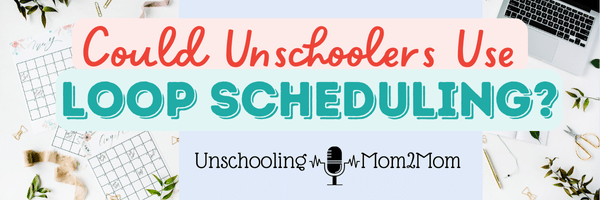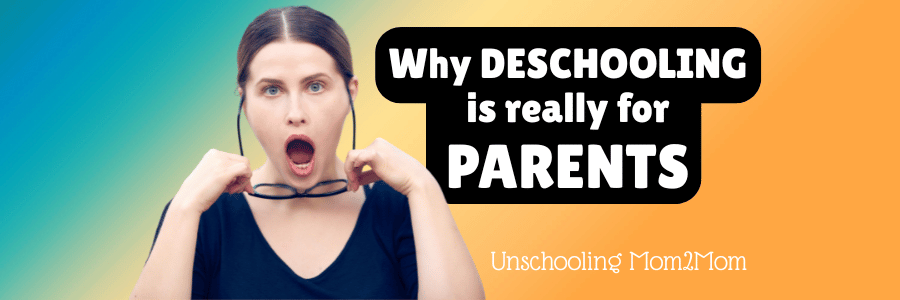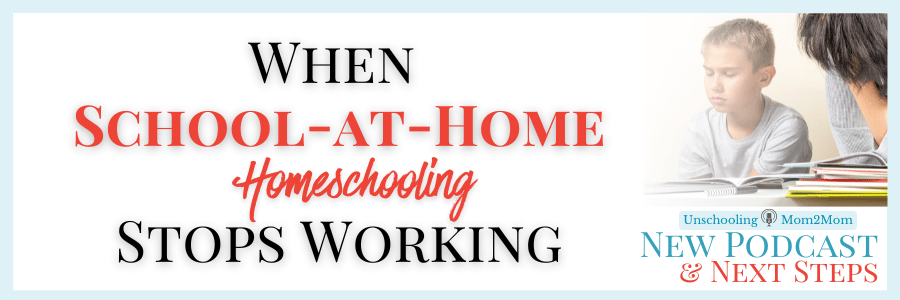Loop Scheduling and Unschooling?
Podcast/Video Transcript
Have you heard about Loop Scheduling? It's something I think many of us have done instinctively - but it’s a thing. It’s not like Block Scheduling... where you think Mondays you do certain things, Tuesdays other, and then different or repeating patterns through the week. Sometimes block scheduling is what you think when you do college classes or maybe you even did them in high school.
The pitfall of Block scheduling, is that if you miss a day and you’re on a weekly Block schedule, you have to wait a week for it to roll back around again. That can be a really big gap.
But Loop scheduling handles that - and is especially good if you have a chaotic life! It allows for so much more flexibility.
Someone asked if Unschoolers use Loop Schedules and I don’t see why not! It just depends on what you’re putting in the Loop, whose interests or activity choices they are.
People always think that unschooling is a Free for All, but it doesn’t have to be.
Flexible? Yes! Absolute chaos - no.

Welcome!
I'm Sue Patterson and this is the Unschooling Mom2Mom podcast. If you’re new here - welcome!
Be sure to subscribe to the channel or the podcast platform you’re using so you can be notified when I do another little Unschooilng Peptalk for you! Usually about 10 minutes - because I know you’re busy.
And I try to get in here once a week!
My own three kids were unschooled - all in their 30s now - and I’m circling back to help families see that Unschooling Really DOES work!
And no, you don’t have to be some extremist. We weren’t.
School just didn’t work for us.
I share what I’ve learned over nearly 30 years in the community - what seems to work and what doesn’t. If you want more from me, join me in my Membership group where we talk twice a week on a group coaching call and have an ongoing WhatSApp channel for help in between the calls. Plus a fabulous community of unschooling parents.
Oh! And if you’d like to talk with me privately, I have $50 coaching calls for the rest of June - be sure to grab those if that’s more your speed.
Ok... on to Loop Scheduling and how that can work for unschooling parents.
So let’s talk about how Loop schedules can work and how you could use them if you’re having a hard time remembering everything.
With Loop scheduling, you make your list of what needs to be done.
Maybe you’ll use it for household tasks, or meals, or personal care.
Then you simply work your way down your list. If you miss a day, no worries, you just pick up where you left off. Then LOOP back up again - hence the name.
Loops for Art
Your kids may like to create Loop schedules of their own - maybe it has to do with exploring certain topics like.. art. They could make a list of all the different media they want to experiment with, then work their way through the list and loop back again.
Maybe it’s
- charcoal drawing,
- pastels,
- textile art of some kind,
- painting,
- coloring with pencils or markers.
Then they loop back to the beginning of their list.
This gives them some organization to their own ideas and helps them not forget what they were considering.
Remind them that their Loop schedule can be modified at any time.
Something can simply “rotate off the list” and they can pop something else in.
Loops for Excercise
Maybe it’s more like varying exercise activities.
Instead of setting them up by day, you make your list and work your way through it.
- Hiking,
- swimming,
- tennis,
- neighborhood walking,
- Dance Party
- then repeat.
This could be activities you and the kids decide you want to be sure to “get around to” or maybe it’s just for you yourself.
Through the Unschooling Lens
So let’s look at all of this again from an unschooling perspective.
Loop scheduling works if you’re trying to remember to get to everything on your list. A list that YOU’VE created. That doesn’t mean you can’t look at these lists I’ve made or someone else has created and NOT duplicate them. It just means that you CHOOSE to use these other lists because they make sense for you and the kids -
not because someone said,
"This is what Good Unschoolers Do." Or Good Parents. Or organized people. Or whatever.
No more broad sweeping generalizations - we’re individualizing around here!
If you find some particular aspect of the loop that you love, but you feel like you have to move to the next thing and keep doing the others until it rolls back again - that’s more like a school system.
You want to be able to pull it out of the loop and do it at the regularity or frequency that fits.
If Zumba classes are on Monday Wednesday and Friday- loop scheduling won’t work for that.
If you decide evening walks after dinner are really great, then that probably won’t fit on a Loop schedule either and can just be penciled into your weekly calendar on it’s own. You can do it - it just doesn’t need to be in your Loop Schedule.
So what else COULD work for a Loop Schedule?
We hear homeschooling families talk about loop scheduling as they’re trying to “cover” all the subjects.and all the individual topics within the subjects. If you’re a traditional homeschooler, Loop scheduling may work better for you than the Block Scheduling that’s more familiar.
But as Unschoolers, we aren’t trying to check those boxes and cover those subjects each week.
We are approaching all of it from the Learner’s perspective.
The system - whether it’s the School, the curriculum, or even the Loop schedule you’ve created, they can interfere with the self-directed process of the Learner. While it might seem good to rotate everything through, that may only be good as an introduction to the variety of topics in whatever category you’re organizing.
Once the kids want more of a certain thing, don’t tell them,
“No, we have to keep with the system we’ve all created!"
That’s prioritizing the System over the Learner - and as Unschoolers, we are moving away from that.
Same goes with keeping something in the Loop Schedule
Meals and Chores on a Loop
Where I really think Loop Schedules can work in Unschooling Families are when you’re tackling
Meal Menus or Household Chores.
Creating a rotation removes the extra time devoted to trying to remember what’s next or what needs to be done. A lot of us have Decision Fatigue because we haven’t planned some things out - things that don’t require flexibility or could be just mindlessly checking the box and moving on to the next when you have time.
Like:
1. Dusting, 2. Vacuuming, 3. Laundry, 4. Bathrooms, 5. Kitchen clean-up.
I did this when my kids were growing up - not really aware it was a Loop Schedule - but it was.
1. Pasta, 2. Tacos, 3. Stir-fry, 4. Casserole, 5. Grilling 6. Pizza
Then if we ate out, we’d just pick up where we left off.
I’d always know what needed to be on the grocery list and what was going to happen - no decision fatigue about food.
Personal Growth for Unschooling Parents
Another way Loop Schedules might be useful for Unschooling Parents is to use it for Personal Growth.
You can list out what you’ll do to keep learning more about Unschooling and Deschooling.
Just like the kids though, you may discover that you have a preference. Maybe you start with
- Podcast
- Video
- Blogpost
- Section of a course youve bought
Then loop back again.
But if you discover that you keep zoning out during podcasts, pull them off the rotation.
Or maybe you discover you ONLY like podcasts and videos, so you might add in more and let the others go.
Looping Your Self-Care Ideas
Loop scheduling can work when you want to add variety to your Self Care routines without taking up mental space to decide what to do..it could look like:
- Reading something for fun
- Making a seasonal craft
- Doing aDeep Breathing technique
- Journaling
- Giving yourself a mani/pedi
And even with these, you may decide,
“I Like reading or journaling before bed every night”
- so go ahead and do that!
And then pull those out of the rotation and replace ut with something you’d like to try in the Loop.
Kid Connection or Family Time - as a Loop
And while I want you to remain flexible in being available to the kids, you might set up a loop schedule for Kid Connection or Family Time:
- Card games (or whatever game they like)
- Read aloud time
- Messy science stuff
- Movie Night
- Going on a bike ride together
- Playing whatever they want you to play for 10 minutes - no interruptions allowed!
- Going out for ice cream
Obviously you’d pick things that work in your family, but setting it up on a Loop Schedule may help you stay on top of it all if you find yourself saying,
“Oh yeah! I forgot we were going to try to do that!”
Another Reason to Join the Private Membership Group!
Over in my Creating Confidence Membership Group I talk with them about making time for certain things, planning for One Week at a Time. These could actually be set up on a Loop Schedule.
- Learn a little about Unschooling or Deschooling (read/listen/watch) whatever works
- Connect with the kids
- Touch base with the unschooling community
- Find something fun locally
- Do Something for Self Care
You can set your loop in whatever frequency you want.
Maybe it’s daily for 15 minutes or so.
Or maybe it’s a few of these, but not necessarily the whole list - then you just keep looping.
So if you’re the kind of person who likes to make a plan but either it’s too long range or you just forget about it because of Life’s interruptions, a Loop Schedule could work for you!
It’s an adaptable structure that even unschoolers could use if they wanted.
If you’d like to hear more about structure, I have another podcast,
#23 called Structure, Schedules, and Unschooling.
You might want to go there next
.
So that’s it from me for now - be sure to subscribe and leave me a comment if you’ve used Loop scheduling and how it worked for you!












